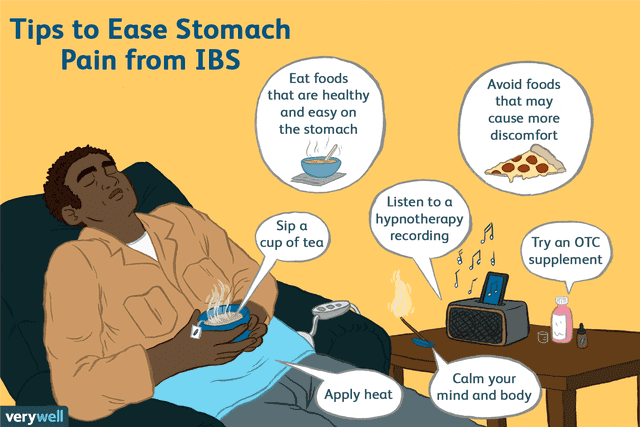How to Quickly Ease Stomach Pain From IBS

Paul Bradbury / Getty Images
Medically reviewed by Stephanie Hartselle, MD
Stomach cramps and pain are defining symptoms of irritable bowel syndrome (IBS) with cramps often getting worse while you poop. The cause of IBS isn't well understood, but the array of symptoms it can cause—stomach pain, gas, diarrhea, bloating, and constipation—can severely undermine a person's quality of life.
Fortunately, there are things you can do beyond IBS medications to find relief. These include making strategic changes in your diet, using therapeutic heat, and practicing mind-body therapies to relieve stress.
The article explains why IBS causes cramping and other digestive symptoms and offers seven easy tips to help relieve poop cramps.

Verywell / Brianna Gilmartin
Why Do I Get Bad Cramps When I Poop?
Irritable bowel syndrome is a functional gastrointestinal disorder (FGID) characterized by painful symptoms in the stomach and intestines along with sudden and severe changes in bowel movements. In addition to pain, a person can experience bouts of diarrhea, constipation, or both.
IBS is thought to be caused by multiple factors, including:
Problems with intestinal motility (movement)
Dysfunction of the gut-brain axis (the signaling between the gastrointestinal tract and central nervous system)
In short, there is not one reason for IBS, and not everyone gets IBS for the same reasons.
Cramping with IBS is thought to be due to visceral hypersensitivity. This occurs when the pain threshold in the gut is lower and any stimuli (such as gas or acidic foods) can cause the brain to overreact.
In response to the perceived pain, the brain will emit nerve signals that cause the gastrocolic reflex (the automatic contraction and relaxation of the intestines) to become abnormally strong and irregular, leading to cramps, pain, and the sudden urge to poop.
IBS cramping is often described as being burning, stabbing, sharp, or throbbing. Typically, the pain improves with a bowel movement but can worsen in some people when pooping or passing gas.
There are many possible triggers for IBS symptoms, including:
Hormone fluctuations (such as during menstrual periods or pregnancy
Certain foods like wheat, beans, dairy, citrus, caffeine, red wine, carbonated drinks, and artificial sweeteners
Medications like antibiotics and certain antidepressants
To better avoid cramping and other symptoms of IBS, here are seven at-home interventions that may help.
Apply Heat
Applying warmth to your belly can help soothe your mind and relieve your IBS pain.
There are a variety of ways to apply heat to your stomach, and all of them work. You can choose the one that you like best and is most convenient for you:
Use a heating pad. Be sure to protect your skin with clothing or a towel.
Try a hot water bottle. This is an excellent choice when you need pain relief as you sleep.
Apply sports creams that treat pain by creating a warming sensation. Pain reliever creams and ointments are a good method of fast pain relief on the go.
Sip a Cup of Tea
Like a heating pad, there is something soothing about a nice cup of hot tea. Each of the following types of tea has a reputation for easing digestive distress:
Peppermint tea is a good choice to soothe your stomach.
Chamomile tea can also help calm the stomach.
Anise tea is good for constipation.
Fennel tea is good for digestion issues.
If you are following a low-FODMAP diet, you may want to avoid chamomile and fennel tea. A low-FODMAP diet is one that restricts certain types of carbohydrates and sugar alcohols that the small intestine can't absorb easily. It is a common treatment for IBS.
Keep your kitchen pantry well stocked and bring tea bags with you when you are out and about.
Eat Carefully
When your belly hurts because of digestion problems, you won't want to make things worse with food. Try foods that are light, healthy, and easy on the stomach. At the same time, do your best to avoid foods that will cause more stomach discomfort.
Foods to Eat
Broth
Lean protein like chicken, turkey, or pork
Lactose-free yogurt
Steamed vegetables
Foods to Avoid
Large, heavy meals
Greasy meals
Once your pain has eased, you can slowly go back to eating your regular diet. If you have IBS and you have frequent stomach pain, you will want to find a ?long-term way of eating that helps ease IBS symptoms.
Related: What to Eat When You Have Irritable Bowel Syndrome
Try an Over-the-Counter Supplement
There are a few products available without a prescription that may bring IBS pain relief:
Peppermint oil has been shown by research to be antispasmodic. This means that it reduces muscle spasms and cramping, which can ease pain.
Gas-relieving products are easily available at stores. If your abdominal pain feels more like trapped gas than cramping, you may find relief by taking a product containing simethicone, a medication that makes gas easier to pass.
Calm Your Mind and Body
When we are in pain, we tend to get anxious. Unfortunately, anxiety can make our pain worse. Taking a few minutes to calm down can be very effective.
Relaxation exercises are a way to break the cycle of anxiety and pain. They offer a way to "turn off" the anxious feelings. They work better with regular practice, but can still offer some benefits for immediate pain relief.
Three basic types of relaxation exercises are:
With a little experimentation, you can decide which methods work best for you.
Use Your Imagination
Believe it or not, you can soothe your body and promote healing through the use of healing imagery. Research shows that using your imagination can lead to positive changes in your body and even decrease the amount of pain you feel from IBS.
After you have calmed your body with relaxation exercises, stimulate your imagination and dream up a few soothing pain-relieving images. Here are some possibilities, but feel free to come up with your own:
Imagine a white healing light coming into your body and swirling all around your belly, healing and soothing your aggravated ?digestive tract.
Imagine that the pain is a hard ball of wax that is slowly melting as you envision a warm, healing heat spread through the area.
Imagine that a soft, healing balm is making its way ?through your system, serving to cool, soothe, and calm the inflamed tissue.
Listen to a Hypnotherapy Recording
Hypnosis has strong research support for easing the symptoms of IBS, including abdominal pain. Ideally, you want to be engaged in an ongoing hypnotherapy treatment program for best results. But when you are in immediate pain, you may be able to benefit from the relaxation of listening to a hypnosis recording that focuses on the gut.
There are quite a few IBS-specific hypnotherapy apps available. It's best to find one that's backed by research, like Nerva.
Summary
IBS is a medical condition that causes abdominal pain, gas, diarrhea, constipation, and bloating. While it's important for your healthcare provider to diagnose and treat IBS, there are things you can do at home to help provide fast pain relief.
Some people with IBS apply soothing heat to the belly using a heating pad or hot water bottle. They may try sipping herbal teas that help with stomach pain.
Other people with IBS find that over-the-counter medications and creams can help. Sometimes relaxation techniques such as visualization, deep breathing, or hypnotherapy can help people with IBS deal with stomach pain.
